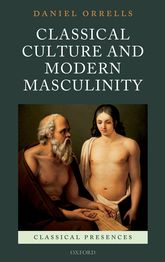 Classical Culture and Modern Masculinity
Classical Culture and Modern Masculinity
by Daniel Orrells
Oxford University Press. 301 pages, $125.
THIS INFORMATIVE STUDY explores the research and writings of 18th-, 19th-, and 20th-century German and British scholars on the classical Greek student-teacher relationship. Classical Culture and Mod- ern Masculinity, by Daniel Orrells, shows how ambivalent these scholars were when viewing the customs of the ancient world. On the one hand, Socrates and his pupils seemed very similar to the teachers and students at German and British universities, especially at Oxford and Cambridge, with their one-on-one tutorial systems. On the other hand, the issue of pederasty, which played an important role in the education of young Greek men, seemed alien and troubling to modern scholars, even those who may have been homosexually inclined themselves. While modern educators wished to connect their efforts to the work of the ancient Greeks, which they saw as exemplary and worthy of emulation in many respects, they struggled to come to terms with an institution for which they lacked even a vocabulary to discuss.
The structure of Orrells’ book in some sense recapitulates the model of teachers and students found in Plato: a pupil learns from his teacher, eventually becoming a teacher himself and passing his knowledge on to his pupils, but with some alterations. The book begins with a close look at German scholars teaching at newly formed universities, who used the Greeks as a model for their reforms, and first began to grapple with the subject of paiderastia. Karl Muller in particular posited that there were two types of male-male love in ancient Greece: the Doric, exemplified by Sparta, which emphasized masculine, soldierly male companionship; and the Ionic, represented by Athens, which praised sexual relationships between older men and younger boys as a critical aspect of the pedagogic process.
British academics like Benjamin Jowett and Walter Pater read these studies and used them in their efforts to reshape the British educational system. Jowett, who reformed the Classics (or “Greats”) program at Oxford, touched only lightly upon same-sex relationships in his own writings. He wanted to write an essay on “Greek Love” but was persuaded to abandon the project by his former pupil John Addington Symonds, who argued that such a project would only confuse his students.
Symonds (1840–1893) knew what he was talking about. Having recognized his own same-sex inclinations through reading Plato’s work, he would eventually write one of the first autobiographies that addressed same-sex attraction from a firsthand perspective. Later, he would experience both a Doric relationship with a solider, as it were, and an Ionic relationship with a schoolboy.
Oscar Wilde would bring the idea of “Greek Love” to a wider audience. An admirer of Walter Pater, he would apply the Doric model in The Picture of Dorian Gray, but in a way that only a few people understood. His trial, however, exposed these views to the wider public, most of whom had never studied Greek and had no particular fascination with ancient sexual practices. His letters to his lover Alfred “Bosie” Douglas, which were full of classical allusions and references to Platonic love, were instead used as evidence of his degeneracy.
E. M. Forster also explored different interpretations of ancient Greek love in Maurice. For the title character, the ideal love entailed a physical as well as an intellectual bond. For his first lover Clive, however, the physical component was unnecessary, which explains why their relationship appears so chaste and why it ultimately ends.
Both Wilde and Forster explored the wide range of views on classical traditions—from the ideal male bond to the depths of perversity—that co-existed in their own times, and indeed throughout much of the three centuries under consideration in this book. Written mainly for academics, Classical Culture and Modern Masculinity provides an in-depth look at the debate over ancient Greece’s most controversial legacy.
Charles Green is a writer based in Annapolis, Maryland.





